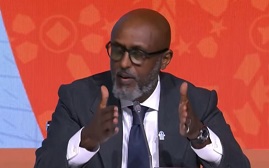By Andualem Sisay Gessesse (Marrakech, Morocco) – Though Ethiopia is one of the few African countries applied for Common Framework debt restructuring and relief, there country has not yet signed a Staff Level Agreement with the International Monetary Fund (IMF) to move the process forward, says IMF director.
“…Countries apply for Common Framework usually at or when they have [IMF] Staff Level Agreement with the staff. We don’t have one yet. I think the government [Government of Ethiopia] is still working on its reform program. So, there is no staff level agreement there,” said Abebe Aemro Selassie, Director at IMF Africa Department, commenting on how the Common Framework works.
He made the remark this morning during a press conference in Marrakech, Morrocco on the sidelines of the annual meetings of the IMF/World Bank. Ethiopia is one of the four African countries along with Chad, Zambia and Ghana applied for the G-20 Common Framework debt relief and restructuring, which was introduced about two years ago.
The Process
“The Common Framework didn’t exist two years ago. We didn’t have official bilateral creditors together in one room to discuss ways in which they work together to address the debt burden of our countries. Already we have had one case – Chad – which has been done and completed,” Abebe said. The second case is where there has been enough progress for us to not to be disrupted in the disbursement. There has been some delay, yes, but no disruption in the disbursement of course that is for Zambia. Program is approved in the context of program framework and year and some months ago; first review is completed and no issue there; now is the second review and the memorandum of understanding is near finalization we understand and that will happen,” he said indicating that the final version will go to the IMF Board approval and may take few weeks to be completed.
According to Annalisa Fedelino, Deputy Director of IMF Africa Department, there was [IMF] mission that ended last week and doesn’t make significant progress. “Policy discussions will continue, most likely we will need another mission [in a few weeks],” she said, speaking to New Business Ethiopia Editor in Marrakech.
“The Common Framework has been active all along. Ethiopia is one case The official creditors’ committee is already formed. So, this actually helps us because the preparatory work has already been moved. I think at this point what the creditors are waiting for is the parameters of a fund program and envelop of the debt restructuring. That needs to be delivered. And this will come once staff level agreement with Ethiopian authorities will be reached. We are almost there; and we are confident that the Common Framework agreement will move quickly,” she said, indicating that the amount of expected debt relief for Ethiopia under the Common Framework is not yet determined.
“Additionally, the Chinese authorities have already provided their [debt] relief to Ethiopia. This is every promising and we understand they are in the process of requesting similar treatment from the other creditors. This is very encouraging,” she said.
The Common Framework is just for official bilateral creditors. “I think there is one Eurobond outstanding. We need to find a way to treat it. This will be part of the discussions we need to have with Ethiopian authorities,” Annalisa said commenting about the private lenders of Ethiopia.
High Cost of Living
Reflecting on the current high inflation and rising cost of living in Ethiopia, Annalisa said: “This is a result of multiple shocks that Ethiopia has been subject to. Obviously like other countries pandemic, Ukraine war, domestic conflict also multiple years of drought, these are have put pressure on the economy. The [Ethiopian] authorities are putting proper response. They significantly tightened monetary and fiscal policy and they have this homegrown reform agenda that they have asked us [IMF] to support”.

